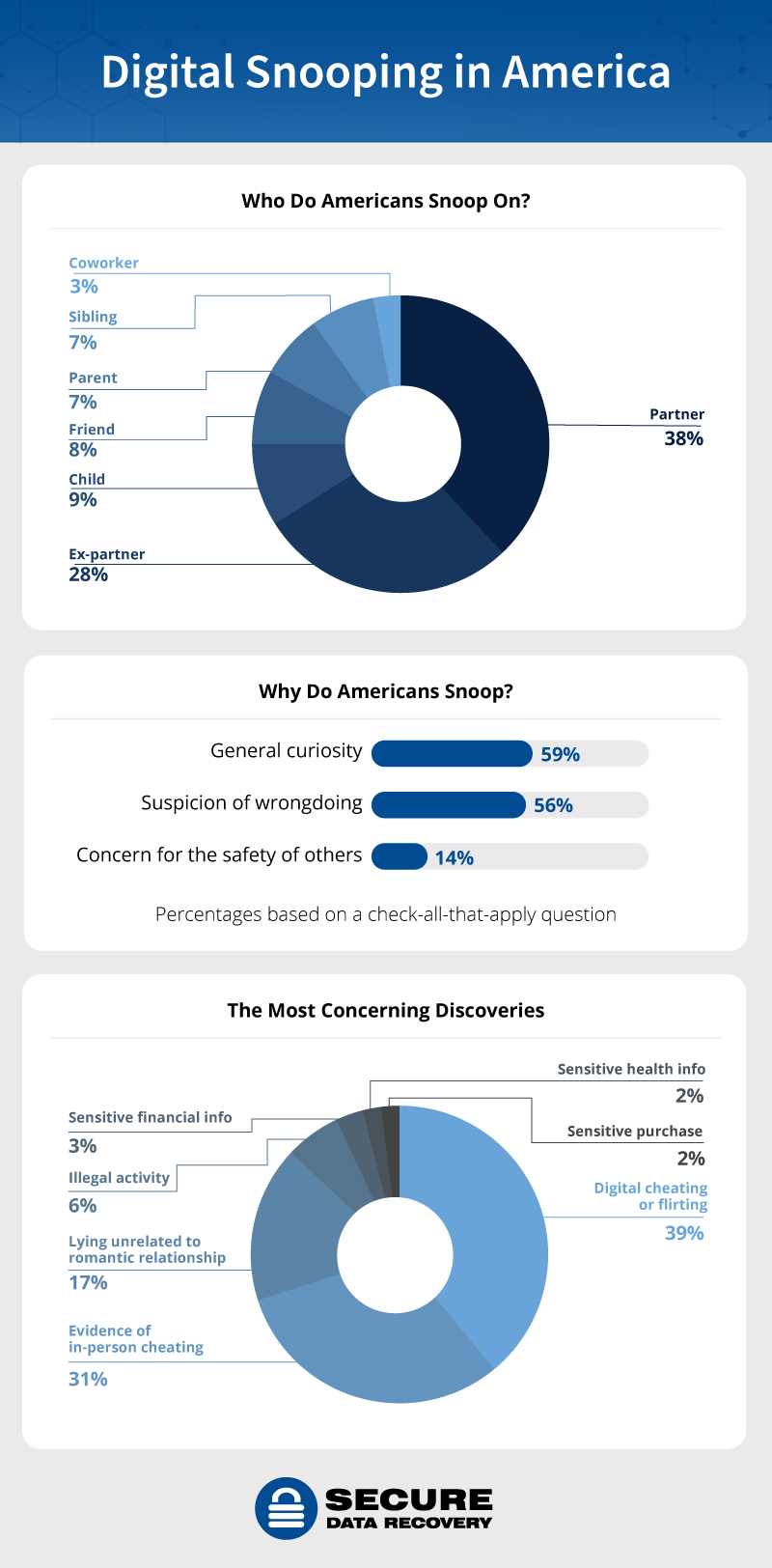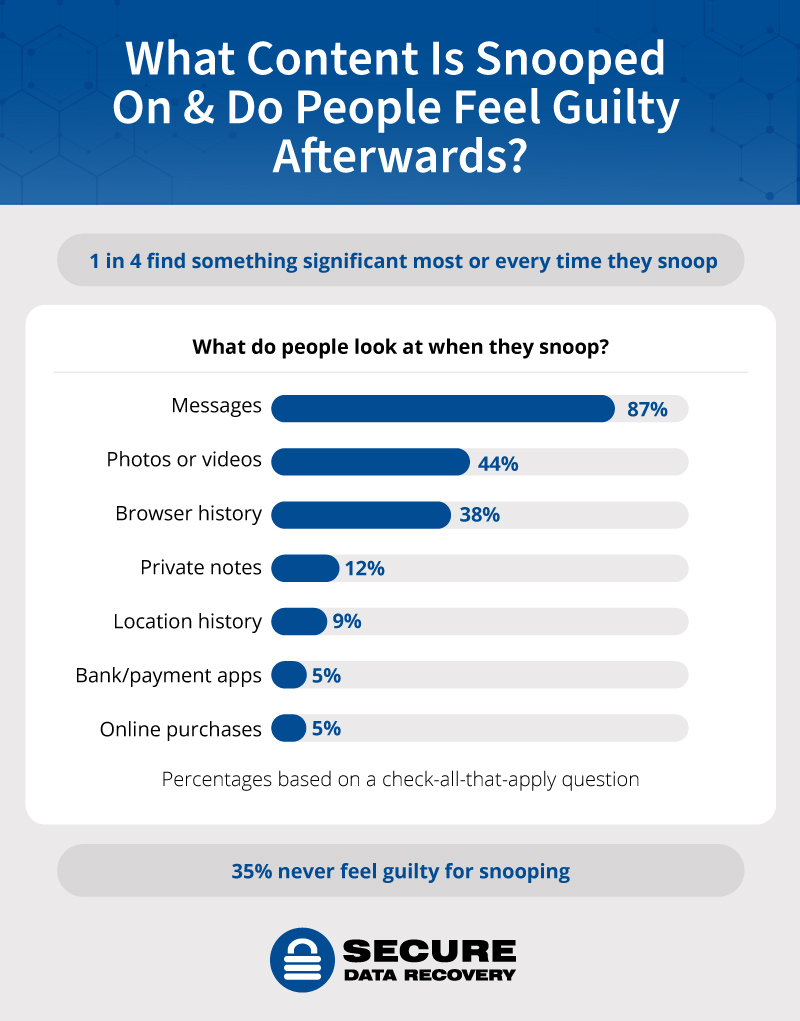By Yevgeniy Reznik, Laboratory Operations Manager
These days, most of us are aware that we leave a digital trail wherever we go online. Search engines know what we look for, advertisers know what we view, and shopping apps know what we buy. Alongside modern data tracking, however, our digital devices are also vulnerable to a more old-fashioned habit: snooping by friends and family.
With electronic devices surrounding us 24/7, it’s no surprise that others are tempted to scope out our phones, tablets, and laptops. In fact, according to a recent Secure Data Recovery survey, a whopping 82% of Americans admitted to looking through someone else’s digital device. Based on the survey results, here we give you the rundown on who is doing the snooping, what exactly they’re looking at, and what they tend to find.

We Have Clear Snooping Preferences
When it comes to snooping, Americans have very clear preferences. Messages take the top spot on the list, with 87% of survey respondents snooping on communications like texts, chats, and DMs. Nearly half (44%) of Americans have secretly scrolled through someone else’s photos or videos, while more than 1 in 3 (38%) have checked out someone’s browser history.
Other types of information are apparently less interesting to snoopers. Far fewer Americans report looking through loved ones’ private notes (12%) and location history (9%). While retail-focused snooping comes in lower on the list, enough people admitted doing it to put it in the sixth spot. Around 5% of respondents said they have looked through someone’s online purchases, and another 5% have looked through bank or payment apps.
The most common reason given for snooping is general curiosity, which may explain why a person would look through the online purchases of others.

We Snoop on Those Close to Us
Whether it’s because we’re more interested in our loved ones or because we have easier access to their devices, we tend to snoop on those we know intimately. For example, Americans are more likely to look at the devices of friends (8%) and even parents (7%) than co-workers (3%).
The overwhelming targets of our digital snooping, however, are romantic partners. A large majority (66%) of survey respondents admitted to snooping on their partner’s or ex-partner’s device, meaning that secret purchase you just made may not be secret for long. Parents may also be viewing what their children are buying online, with 9% of Americans saying they snoop on their child’s devices.
We Make Some Concerning Discoveries
When we snoop, what do we find? Over half (53%) of Americans report discovering something incriminating or concerning from snooping. A full 1 in 4 say they find something significant most or every time they snoop.
Mirroring the preferred snooping targets, most of our snooping discoveries regard our romantic partners. Nearly 2 in 5 Americans (39%) said they found evidence of digital cheating or flirting, while almost 1 in 3 (31%) found evidence of in-person cheating.
Fortunately for people who love to shop online, only 2% of Americans report discovering a sensitive purchase when snooping on their loved ones.
We Only Sometimes Feel Bad About It
Perhaps because most snoopers make incriminating discoveries, many don’t feel bad about it. Over a third of respondents said they don’t experience regret or remorse after looking through someone’s device. On the other hand, maybe they don’t feel bad because they haven’t been caught. In fact, more than 3 in 4 Americans (81%) said their snooping has never been discovered.
Snoopers’ remorse varies by gender and generation. Women are more likely to snoop (88%) than men (77%), and are less likely to feel bad about it afterwards. Perhaps surprisingly, baby boomers are the most likely to not regret snooping, suggesting that age and experience may play a role in shaping attitudes toward the behavior.
The Bottom Line
The good news is that your online shopping activity is likely safe from the prying eyes of friends and family, but mostly because it doesn’t interest them. The bad news is that the chances are high that someone you love is spying on your devices. Since technology is increasingly integrated into our everyday lives, it’s important to set boundaries with loved ones about digital devices. Are you an open book or do you expect strict privacy? Discussing feelings and expectations can help prevent surprises and confrontations later on.
Whether you want to reduce snooping by those around you or cut down on the chances of fraud by strangers, increasing security and privacy on your devices is always a good idea. Make sure you have a secure lock screen, consider shortening the time before auto lock kicks in, and look into implementing two-factor identification. If you’re worried about someone using your device to make purchases, you can turn off auto-fill, disable in-app purchases, and require a password to buy anything.
Methodology
Secure Data Recovery interviewed more than 1,000 people in the United States about their digital snooping habits. Respondents ranged from 18 to 76 years of age.
About the author

Yevgeniy Reznik is Laboratory Operations Manager at Secure Data Recovery Services in Cleveland, Ohio, and has more than a decade of experience as a data recovery engineer. He graduated from Cleveland State University with a degree in computer science and spent 15 years as an IT entrepreneur and small business owner before joining the company.
Related Articles

The Rise of Digital Experience Platforms (DXPs) in Software Development
Software development is evolving, as Digital Experience Platforms enable the delivery of a personalised digital cross-channel experience. A DXP delivers integrated content, Artificial Intelligence, and low-code rapid application development tools. It streamlines the work of developers as well as marketers.

7 Employee Benefits That Can Help Your Business Increase Staff Retention
With so many businesses vying for the attention of skilled job candidates, it’s becoming more important to look for ways to make your offerings more appealing by adding unique perks that not every employer does.

How Retailers Can Prepare for the Summer 2025 Shift
Rather than focusing on isolated touchpoints or departmental KPIs, journey management provides a way to understand where the most critical pain points lie and how to resolve them systematically across the business.

Retailers Are Drowning in Data – Journey Management Could Be the Lifeline
Rather than focusing on isolated touchpoints or departmental KPIs, journey management provides a way to understand where the most critical pain points lie and how to resolve them systematically across the business.



 for the latest news and job opportunities in retail tech
for the latest news and job opportunities in retail tech 